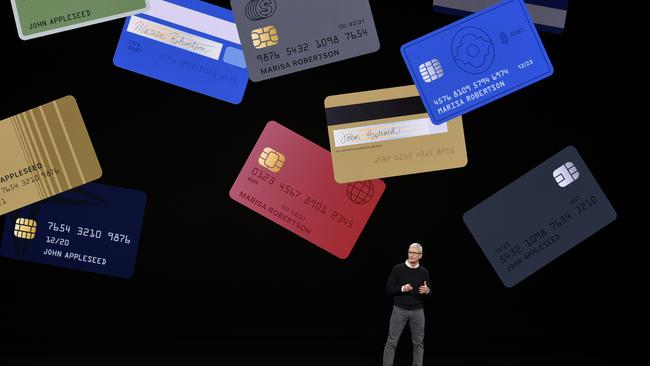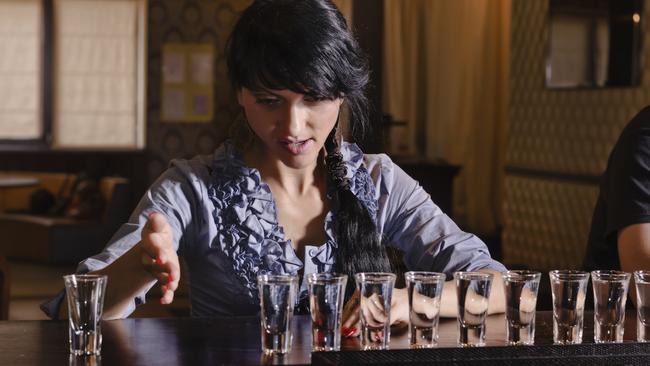Barefoot Investor: Fancy credit card will upset the Apple cart
This week Apple announced it’s launching a credit card simply called “Apple Card”. And it’s titanium, baby. But if you strip out the metal and the marketing, this is just another “debt card”. And you don’t need another one of those, writes the Barefoot Investor.

Barefoot Investor
Don't miss out on the headlines from Barefoot Investor. Followed categories will be added to My News.
Sir Richard Branson leaned across the table, smiled, and winked at me.
“It’s pretty sexy, right?”
In his hand was a credit card — a Virgin credit card with an aesthetically revolutionary “clipped corner”.
That boozy night happened, from memory, about 16 years ago.
At the time Branson was banging on about his card helping people, while simultaneously sticking it to the “fat cat banks” (and making himself a boatload of cashola).
This week Apple announced it’s launching a credit card (only in the US to begin with), simply called “Apple Card”.
And it’s titanium, baby.
As in metal. Laser-etched.
There are no numbers on the front, which coincidentally makes it safe to show off on Instagram, if you’re so inclined (and the people who get this card most certainly will be).
And it’ll totally blow the mind of the 7-Eleven attendant when you plonk it down to buy some Cheezels.
Attendant looks down at shiny metal card … then looks up at you, slowly studying your face.
“Are you some kind of celebrity big shot … Mr Cheezel man?”
Yeah, no.
This week Apple chief executive officer Tim Cook gushed about his new credit card: “While we all need them, there’s some things about the experience that could be … so much better.”
OK, so I’m going to pull you up on that one, Timbo.
You actually don’t need a credit card. (Well, maybe if you’re spending $319 on wireless Airpods, which make you look like, to quote my old man, a “bloody drongo”.)
Strip out the metal and the marketing and this is just another “debt card”, and not a particularly revolutionary one: Apple’s fine print shows it charges up to 24.24 per cent interest on the card.

However, there are a couple of things they’re doing that are interesting:
The first is the tech — as you’d expect from Apple, they’ve got a great app for the card which allows you to easily categorise and track your spending, and “gamifies” and personalises it to help you make better financial decisions.
That being said, a lot of these features and tracking are already here in Australia with Up Bank.
And within a couple of years all banks will offer this.
The second is the card’s rewards system.
They’re going with daily cash back instead of points.
This makes total sense. Frequent Flyer points are s-o-o-o 2007.
Banks and airlines have created their own confusing alternate currency for much the same reason that Zimbabwe issues trillion-dollar notes — to deliberately confuse the poor plebs who are forced to use it.
Bottom line?
The Aussie banks will be disrupted over the next decade, make no mistake.
However, I’m not sure it will be by Apple, who are just trying to fill another hole by building their “ecosystem” as iPhone sales stagnate.
And remember: the Apple Card is still just a credit card.
So while it’s a danger for our banks … it’s also a trap for iPhone users.
Tread Your Own Path!

Q&As
THE ALCOHOL EXPERIMENT
SIMON ASKS: Last week you answered a question from Jane (“I am not an Alcoholic”), who was clearly struggling with alcohol.
For people who are after help with stopping or reducing alcohol intake (not physiological-addiction-level alcoholics), I strongly recommend the book The Alcohol Experiment by Annie Grace.
It helps you to do 30 days alcohol free, to start.
I drink a moderate amount and, after one or two, always hanker for another, but after reading the first chapter of this book I found it easy to give myself a decent amount of time completely off booze.
It changes your relationship with alcohol, including challenging why you drink, in much the same way that you — as the Barefoot Investor — change people’s relationship with money, including what they spend (on “postcode povvo” houses and fancy cars!)
BAREFOOT REPLIES:
I love my community.
They’re always sending me fascinating stuff that I’ve never heard of this before, like this book.
Now, of course, I don’t have a problem with alcohol.
Then again, on Tuesday night I caught up with an old mate (one beer), on Thursday I went to dinner with another mate (two beers), and on Friday about 20 of us went to the comedy festival to celebrate a friend’s opening night and, given we all had babysitters, we had (many) drinks afterwards.
Hmmm.
Anyway, I read the The Alcohol Experiment and it’s a cracking book that really opened my eyes (and I can understand why it’s getting so many rave reviews across the internet).
And if you give up the grog, amazing things can happen, like Leah found out in our next letter.

SHAKEN, NOT STIRRED
LEAH ASKS: I just wanted to drop you a line from the comfy living room of my first property.
If you’d told me 2½ years ago that I’d own this place today, I would have dropped the dirty martini in my hand!
At $25 a pop, those drinks (which I had regularly) didn’t come cheap, but they sure numbed the fact that as a single, 35-year-old woman I would never own my own home! Or so I thought.
My father got fed up with my bleak outlook, so he gifted me your book for Christmas 2016. To say it changed my life is an understatement.
The best thing about the book is its foolproof nature ‒ no knowledge of money required.
All I had to do was follow a few simple instructions, check in on my savings from time to time, and eventually I had a property deposit. Not only this, your book has taught me to be self-reliant, to take responsibility for my life, and has given me confidence about my future.
I even gave up booze along the way — a great move if you ever want to see money pile up at warp speed.
If you’d met me in 2016, I’d have told you (probably slurring) that I was terrible with money.
Your book has since taught me that anyone can be good with money.
BAREFOOT REPLIES: Yes, I seem to have a booze theme this week.
Well bugger it, let’s run with it — in many parts of the country, property prices are staggering around like a drunk at closing time.
However, the real opportunity for first home buyers will come in the next few years when the debt hangover really kicks in. Mark my words, this is a genuine opportunity for first home buyers … but only those who have been soberly saving. Congratulations on your success, Leah. You should feel proud.

USE YOUR INTUITION
MANDY ASKS: You believe in people following their intuition (“in-tuition”’ or “inner teacher”), right?
Well, I made the move from charity work to psychic work in 2011, and I keep having the same dilemma.
People think it is greedy (if not evil) to charge for what I do!
This has made me terrified to become successful, as I feel like I am wearing a bullseye on my chest.
I can hardly sleep. What advice do you have for those who want to be spiritually and financially rich?
BAREFOOT REPLIES:
All I can say, Mandy, is that you should be an Australian fund manager — they believe they are psychics (who can pick winning stocks and outperform the market, even though the evidence suggests they cannot).
Yet they have no problem charging people for their psychic stock-picking (even though their crystal balls are very cloudy).
All jokes aside, if you believe in your business, and people are prepared to pay you for your services, I don’t see a problem. Focus on the people who pay you, not the people who don’t.
The idea that you have to choose between being spiritual and being rich is a concoction brought about by tightwads who just want something for nothing.
It’s what you do with the money that counts.
If you have a burning money question, go to barefootinvestor.com and #askbarefoot
The Barefoot Investor for Families: The Only Kids’ Money Guide You’ll Ever Need (HarperCollins)RRP $29.99
The Barefoot Investor holds an Australian Financial Services Licence (302081). This is general advice only. It should not replace individual, independent, personal financial advice.


